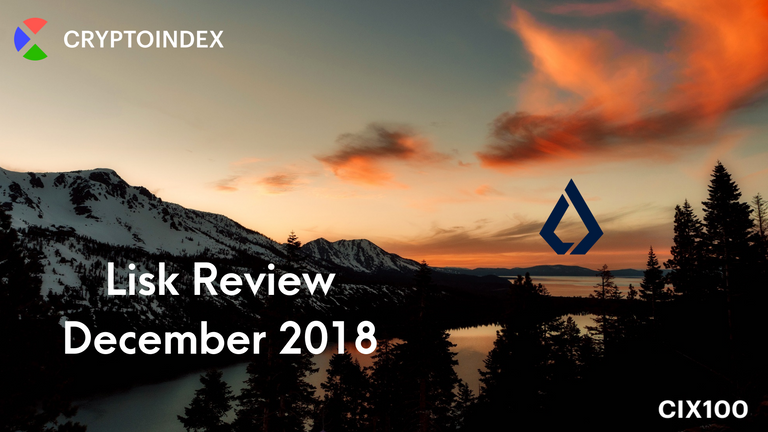
Cryptoindex is a tool for exposure to the cryptomarket and serves as a smart benchmark for all cryptocurrencies. The AI-based Cryptoindex algorithm is continuously analyzing more than 2000 coins applying over 200 factors, processing more than 1 million signals per second to provide a highly sophisticated index of the top 100 coins.
You can find our previous reviews here:
0x Protocol [ZRX] Review. November 2018.
Maker. Review - October 2018
Dogecoin Rewiew
Tether. Review
VeChain. Review
Why Cryptoindex is unique?
Zcash.Review
Tezos. Review - September 2018
Monero. Overview
Binance Coin. Review
IOTA. Review. August - 2018
NEM.Overview
Ethereum Classic.Review
TRON overview.
Cardano - review. Future plans.
Ripple - review. Further Perspectives
Litecoin. June'18 overview
The Dow Jones index. From where did it come to us?
Bitcoin Cash. June 2018 overview
Are cryptocurrency indices a new crypto market trend?
EOS. End of May'18 overview
Ethereum. May 2018 overview
Here on our Cryptoindex blog, we will be posting 100 articles about each of the top performing coins selected by our powerful AI algorithm#CIX100coinreview.
Today’s review: Lisk
Lisk is a platform that can become a springboard for the creation and development of many decentralized applications based on blockchain technology. The main advantage of Lisk before its main competitor Ethereum is the ability to program applications in JavaScript language. The JS language is one of the most used languages in application development at the moment.
Based on own Blockchain network and LSK token, the platform will allow developers to create, distribute and manage Blockchain decentralized applications by deploying their own side chain associated with the project network, including a custom token.
Thanks to the flexibility of the side chains, developers can fully implement and customize their Blockchain applications.
Lisk is a cryptocurrency and platform for decentralized applications. Like any cryptocurrency, mostly like Bitcoin and other cryptocurrencies, it provides a decentralized payment system and a network of digital money.
The network itself operates using a highly efficient delegated share confirmation model (DPoS), protected by 101 democratically elected delegates.
Lisk allows developers to create and publish chain-linked applications with their own connections. This is an open source platform. It was announced in early 2016. The first release took place in May 2016, when it was forked from Crypti by founding developers Max Kordek and Olivier Beddows., Like other blockchains, it has its own LSK currency inside the platform. Lisk is often compared to Ethereum because both of them are blockchain-based platforms that allow developers to create applications.
The platform allows developers to create “blocking applications” by linking to the Lisk blockchain, while Ethereum lets them build up “decentralized applications” in a virtual machine on the main blockchain of Ethereum.
In fact, Lisk and Ethereum are often compared to each other. Both platforms are blocked changer-based systems that attempt to extend the original idea of bitcoin blockchain by creating decentralized applications.
While Ethereum calls its applications "decentralized applications" or DApps, Lisk calls them "blocking applications."
Here’s the list of other key differences between Lisk and Ethereum:
· Lisk uses JavaScript as the application's language, while Ethereum uses Solidity
· Lisk uses side chains to store applications and Ethereum stores applications in the main chain
· In Lisk, application problems require developers to create a rigid fork in their side chain; in Ethereum, applications run on a virtual machine, so any error can lead to a waste of transactions, but they are contained in the virtual machine itself
· There is no virtual machine in Lisk, while Ethereum has its Ethereum virtual machine (EVM)
The developers of the new fork decided to resort to the original method of mining coins, different from the traditional mining. This method is called “forging,” and it is based on the PoS algorithm. The main difference between it and usual mining is that not all project participants will be involved in the mining of coins, but only certain “delegates” in the amount of 101 people. All the others will vote for these delegates and receive one coin for it. Those who will be elected will be able to start their own private pools and engage in the mining of coins, which will later enrich all the participants.
LSK has long-term growth potential. The rebranding of the network can influence its growth. Nevertheless, everything will depend on the actions of the developers: whether they can adapt their product to the needs of the community, integrating with other systems. Summing up, we can say that the forecast for the Lisk rate (LSK) is moderately positive. Cryptocurrency will grow with short-term jumps, however, it is unlikely to beat more competitive capitalization projects.
At the time this article was published, Lisk makes up 0.13% of the total of CryptoIndex portfolio.
You can always check the current CIX100 composition on our MVP platform: http://cryptoindex.ai/
Stay updated on our channels:
Follow CRYPTOINDEX on Telegram
Follow CRYPTOINDEX on Medium
Follow CRYPTOINDEX on Twitter
Follow CRYPTOINDEX on Facebook
Follow CRYPTOINDEX on Linkedin
Follow CRYPTOINDEX on Reddit
